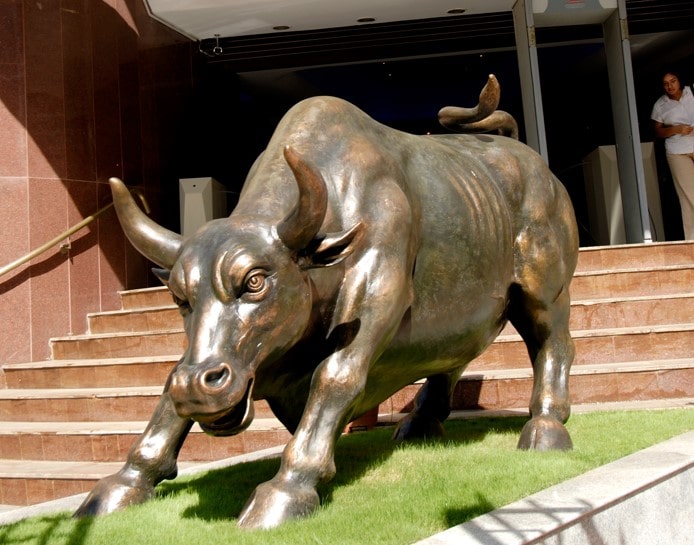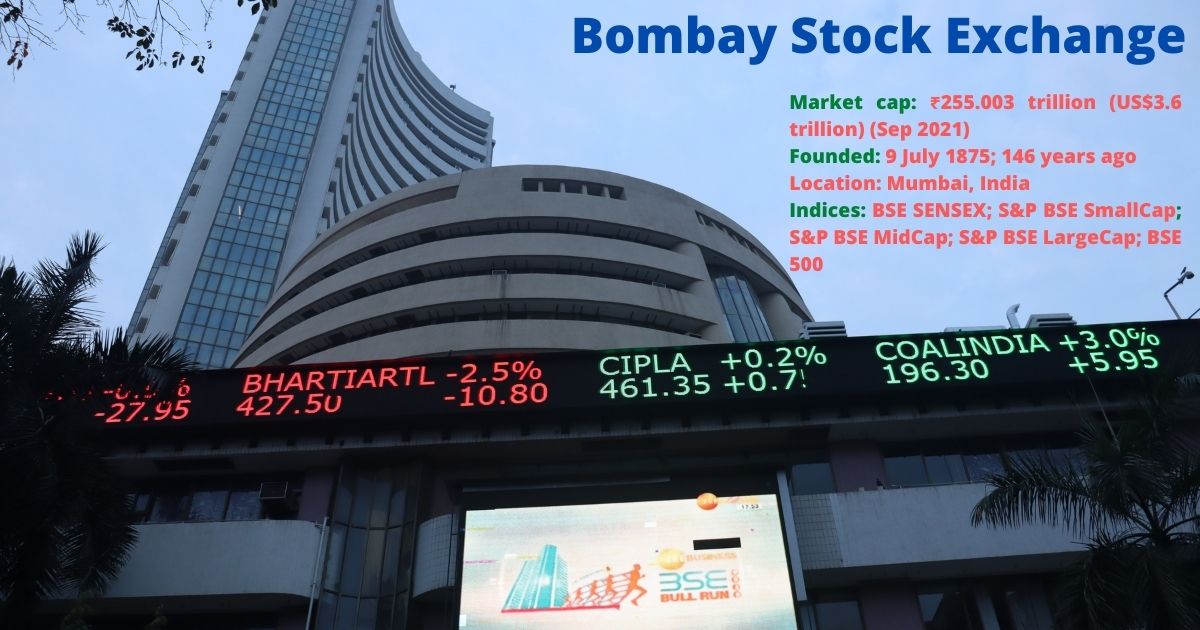BSE India – The Bombay Stock Exchange India was established in 1875. This is the largest and first security exchange firm in India. Located in Mumbai, The BSE India is also one of the largest exchanges in the world, listing close to 6000 companies. Over the years, the BSE has helped expand the Indian corporate sector by developing the country’s capital market, including the retail debt sector. BSE India also has a platform for equities trading for small to medium sized companies. The BSE has also branched out by providing various capital market services like settlement, clearing, and risk management. Read on to know more about the first security exchange firm in India.
BSE India at Dalal Street

The Bombay Stock Exchange is located in Downtown Mumbai on Dalal Street. During the 1850s, brokers usually conducted business under a banyan tree in front of Mumbai town hall. Following a few decades of meetings at various locations, Dalal Street was chosen as the official location for the Native Share and Stock Brokers Association, which would later turn into the BSE India.
Over the years, Mumbai has become one of the major financial hubs of the country as well as the world. Dalal Street has now become a home to various investment firms, financial institutions, and banks. Dalal Street itself draws comparison to Wall Street in the United states, in terms of importance to the financial market of the country. The implementation of Dalal Street is used by Indian investors and press as a figure of speech to represent the Indian financial sector.
History of BSE India
The Bombay Stock Exchange was established in the year 1875 in Mumbai. Before the construction of Dalal Street, the Native Share and Stock Broker’s Association was just a group of 5 brokers that used to conduct their business under a banyan tree in front of the Bombay Town Hall. But as the number of brokers increased, a need for a permanent place of business arised. The group got its first business location near the town hall and registered as an official organisation in 1874.
The organization continued its operations from the same location until 1928. The present office at Dalal street was acquired by the group in 1928. The construction of the building was completed in 1930.
BSE India earned recognition from the Government of India in 1957 under the Securities Contracts Regulation Act. The current building was completed in the 1970s and was occupied by the stock exchange in 1980. Initially called the BSE towers, it was renamed as P. J. Towers in the memory of the late Sir Phiroze Jamshedji Jeejeebhoy.
Functioning of Bombay Stock Exchange
Initially, BSE India implemented an open outcry floor trading method for their business activities. In this method, traders and brokers gathered on a ‘pit’ and used hand and voice signals to transfer information about different types of transactions. This method can also be called an open floor system or floor trading system.
This system was used by the stock exchange till 1995. Introduction of new technology and rapid globalisation led to a shift to the modern electronic trading system. The new system was found to be far more reliable, fast, and effective than the previous system. The new method helped vastly in eliminating errors and loopholes that were prevalent in the previous floor trading system.
In the new trading system, the need for traders and brokers to gather in the pit was all but eliminated. The process was widely accepted by all the brokers and traders. The migration to the new trading system was fairly quick, as the exchange only took 50 days for the transition. The sophisticated new trading platform was called BOLT (BSE’s Online Trading System). The new system has the capacity to process over 8 million orders everyday.
Functions and Features of BSE India
The following are some of the key distinctive features of the Bombay Stock Exchange:
- The BSE India has played a major role in developing India’s capital market and improving the state of the Indian corporate sector
- The BSE uses SENSEX30 as a benchmark index. It encompasses various companies from 12 different sectors
- It is India and Asia’s oldest stock exchange
- The BSE lists many security options like stock futures, stock options, weekly options, index options, and index futures
The following are some of the functions performed by the BSE that makes it so important for the country’s corporate sector and economic health:
Price Determination
The price of the secondary market’s financial segments depend on two factors; demand and supply. BSE helps in this context by constantly providing valuation of the listed companies and their securities. Investors can go through various indices (like SENSEX) to determine the future movement of the market.
Economical Contribution
The BSE India also plays a huge role in boosting and maintaining the economy of the country. The constant flow of money through the market helps in growing the national economy. The continuous transactions of selling and reselling of listed securities allows for greater capital and funds movement.
Raising Capital
The BSE India makes it possible for many companies in India to go public and raise capital from the people. Companies that meet all the criteria can get listed with the stock exchange and raise funds using various financial segments.
Liquidity and Marketability
The securities listed with the BSE have a far better liquidity to marketability ratio than any other investment option. It is very easy for an investor to sell securities and convert them into cash. These transactions can be carried out by the investor completely at their own discretion.
BSE India Listing Procedure and Requirements
A dedicated listing department has been set up by the BSE India in order to provide approval for the listing of securities. The listing is done in accordance with the Securities Contracts and Regulation Act of 1956 and Companies Act of 1957. The following is the eligibility criteria for getting securities listed with BSE:
- The applicant company should have a minimum paid-up capital of ₹ 10 crore for IPOs and ₹ 3 crore for FPOs
- The issue size cannot be lower than ₹ 10 crore
- The applicant company should have a minimum market capitalization of ₹25 crore
Listing Process of BSE India
Listing on BSE India can be divided into 3 steps, which are as follows:
BSE Grants Permission to use Name in Prospectus
Companies that wish to list securities with BSE are required to obtain an approval to use the name of the stock exchange in their prospectus prior to filing the same with the office of Registrar of Companies. The decision of granting permission is taken by a listing committee composed of market experts. The committee takes the decision by evaluating the company promoters, projects, company, risks, and other such related factors.
Submit the Letter of Application
Section 73 of the Companies Act of 1956, a company which wishes to list securities with BSE India is required to submit an application letter to every stock exchange where it wishes to list the securities.
Security Allotment
In accordance with the Listing Agreement, a company is required to complete the allotment of securities within 30 days from the date of closure of the subscription list. The company also has to approach the Designated Stock Exchange for allotment approval.
Trading Permissions
After the approval of basis of allotment, the company has 7 days to wrap up all the formalities regarding trading at all the stock exchanges they are registered with.
Benefits of BSE India Listing
The securities listed in BSE get an exclusive privilege. Only the listed stocks are quoted on the listings of BSE. Some of the major benefits of listing are as follows:
- Listing their securities on the stock exchange allows the companies to raise capital from the public for acquisitions/new projects/expansions. It also gives an exit strategy to investors as well as liquidity to ESOP-holding employees
- Listing facilitates marketability and liquidity of securities on a recurring basis, all the while adding to the prestige of the company
- A listing also increases the company’s ability to raise funds. This also helps to attract further potential investors
- All the listed security listings are regulated and monitored by the stock exchange, thus eliminating unfair practices
- The prices for the securities are decided on the basis of demand and supply. The prices listed on the stock exchange are usually indicative of the actual value of the security. Which means that listing helps in generating an independent evaluation of the company
- Violation of any of the clauses of the listing agreements can lead to a delisting of securities. This ensures that all the companies follow fair trading practices for the advantage of public and investors
What are the Share Market Indices in BSE India?
An index in the share market is an indicator of the changes taking place in the securities market. The indices are created by grouping together a few securities already listed on the exchange. The stocks for index creation are picked on the basis of industry type, size of the company, and market capitalization. The value of the underlying stocks are used to determine the overall index value. The indices and value of underlying stocks have a directly proportional relationship. If the value of the underlying stocks increases, then the value of the stocks also increases.One can say that these indices are an indicator of market sentiment. Some of the indices in BSE India are as follows:
- S&P BSE Sensex
- S&P BSE Smallcap
- S&P BSE Midcap
- S&P BSE LargeCap
- S&P BSE Dividend Stability Index
How do BSE India Stock Market Indices Help?
The stock market indices can be thought of like a barometer showing the collective condition of the market. They assist in identifying the general behaviour of the market. Investors use these as a reference to decide what stocks are the best for investing. Some of the prominent importance of indices are as follows:
Helps in Stock-Picking
When you venture into the securities market, the sheer number of investment opportunities could make for a daunting investment experience. You will notice the need for a benchmark for the differentiation of the stocks. Therefore, sorting the stocks that are best for investment can be a little tricky. An index acts like a differentiator that helps in grouping stocks on the basis of industry type, sector, and size of company.
Represents Market Trend
There is a fair bit of risk involved with investing in the share market, which makes it super important for you to understand the implications of your decisions. Studying and understanding patterns of every individual stock is an impractical task. This is where market indices come into play, they act as representations of the trend of the market or any particular sector. For example, an index of pharmaceutical stocks will act as an indicator of the stocks of pharma companies.
Helps in Stock Comparison
Before you start in any particular stock, it is important to assess whether the investment is worth it. You can easily see how a stock is performing by comparing it with the underlying index. If the returns from the stock are higher than the index, then the stock is said to have outperformed the index. On the other hand, if the returns are lower than the index, then the stock is said to have underperformed.
Indicates Market Sentiment
One of the most important things an investor should be aware of is the sentiment of the market. This is so because the price of the stock can be very easily affected by the investor’s sentiment. Knowing the reason behind the rise/fall of stock prices can help you in taking a much more informed decision. In this respect, indices play a huge role gauging the mood of the market.
In Conclusion
The BSE is India’s oldest and most well-established stock exchange in India. Established in the 1850s, the founding members had no idea that they were taking the first steps towards building Asia’s largest stock exchange. This exchange was established with the aim of catering to market requirements and generating ease in investing. Ranked as one of the gtop exchanges in the world, BSE India has helped develop a more robust economy. It has many features and benefits that truly makes it unique. We hope this article has helped you understand the country’s biggest stock exchange a little better. Happy learning!
List of Top Turnovers Companies 2021
| Top Turnover | LTP | Turnover(f Cr.) |
| IRCTC | 5467.35 | 341.98 |
| TATAMOTORS | 497.45 | 267.74 |
| TATAPOWER | 222.45 | 236.32 |
| ITC | 256.55 | 153.85 |
| WIPRO | 707.55 | 135.14 |
| ADANI PORTS | 811.90 | 134.35 |
You May Also Like :
| NSE India | Equity Shares |
| Cryptocurrency | Stock Market |
| Market Capitalization | Coin Market Capitalization |
Frequently Asked Questions (FAQ)
Who is the owner of BSE India?
Mr. Ashishkumar Chauhan is the MD and CEO of BSE India. He is also one of the co-founders of NSE.
How many companies are listed in BSE India?
As of the financial years 2020, there are over 5,400 companies listed with the Bombay Stock Exchange.
What is the minimum paid up capital requirement in BSE India?
In accordance with SEBI guidelines, the minimum paid up capital requirement is ₹ 30 Lakhs.
































































